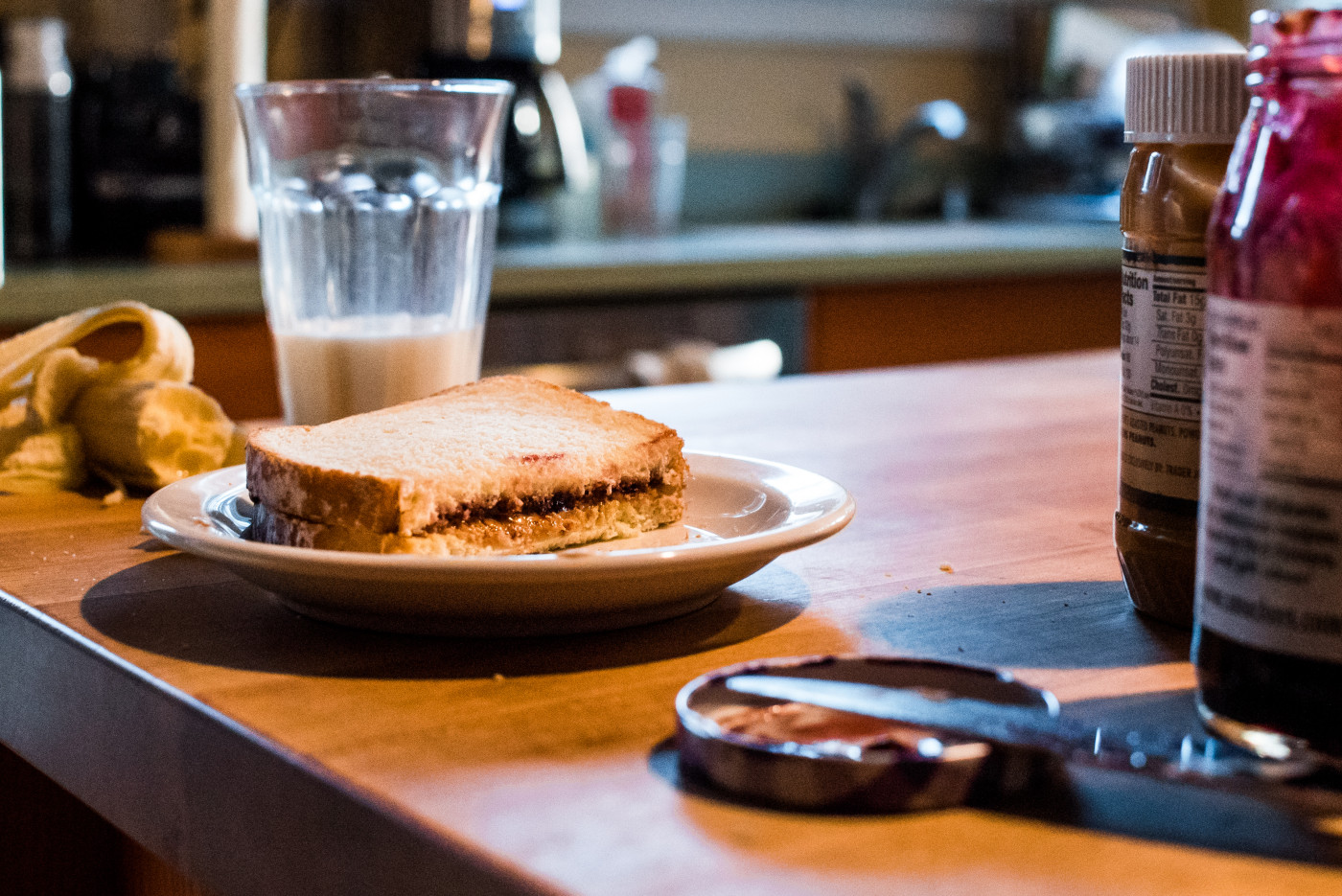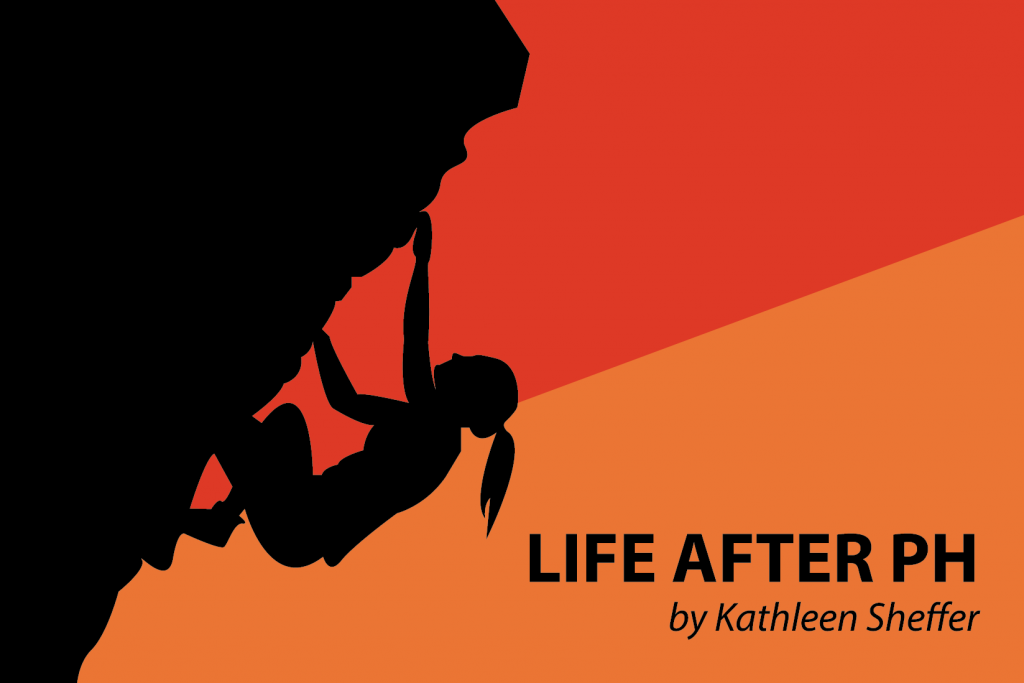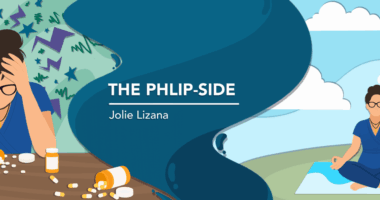My Love Affair with Food

PB&J. Photo by Kathleen Sheffer
Like others in my life, my relationship to food has changed drastically since my heart-lung transplant. Food is so important to me that I once listed it as a main source of happiness in my life (during a rough period in high school). Surprisingly, I have to think even more about food these days.
I was careful not to eat too many dark leafy greens, which would affect my closely monitored anticoagulated blood. Other than that, I could eat pretty much whatever I wanted when I had pulmonary hypertension (PH). My doctor gave me permission, actually. As long as I was eating, she didn’t care what it was. She probably didn’t know just how many dill pickles and bags of Hot Cheetos I was consuming. Another doctor encouraged me to eat all the popcorn I wanted, as long as I put plenty of butter on it.
Friends envied that I hardly ever gained any weight, my sick heart was burning calories for me. I routinely woke up nauseated, and once vomited in my zero period Latin class. As a result, most breakfast foods were unappetizing until after my transplant. (Turns out pancakes aren’t so bad, after all.) If I could stomach toast one morning, I couldn’t the next day. I had to have variety. My mom went crazy dreaming up new ideas for school lunches I might eat. Gourmet sandwiches, soups in thermoses, chips and layered bean dip. She’s a saint. And still, I usually would throw out some.
One morning after my transplant, I woke up early to go on a hike. I took a photo of the peanut butter-and-jelly sandwich I was eating for breakfast because the whole scene was such a contrast to my life with PH, during which I normally slept past 10 a.m. and gagged at the mere mention of a PB&J.
With a deluge of other health considerations, I’ve learned to relish foods that are easy to prepare and digest. I’ve made PB&Js, smoothies, PowerBars, bananas and yogurt staples of my diet. Nerve damage during my surgery led to severe gastroparesis. My stomach empties at less than 30 percent of the normal speed, so my gastroenterologist advised a low-fat, low-fiber diet. My doctors worry I might aspirate some of my food if I eat too much all at once. Fortunately, I’ve been able to increase my fiber intake by chewing well and eating small meals.
Last week, my aunt teased me for eating constantly as we prepared Thanksgiving dinner. During the afternoon that I’ve been writing this, I’ve eaten a sandwich, a few bites of leftover yams, some soup, a piece of dark chocolate (high in magnesium!), and a yogurt. So, she may have a point. Prednisone gives me the munchies, and I’ve always used eating as a form of procrastination. But I have some practical reasons for this as well. I need to be sure to eat enough calories in a day and avoid getting so hungry that I eat too quickly or too much. Although it’s completely against my nature, I didn’t go back for seconds this Thanksgiving, so the snacking must have helped!
What to eat next preoccupies much of my brain space. Because I take pills several times a day, I’m also thinking about what medication to take next. I have to take one antifungal medication on an empty stomach and an hour before eating. That’s not such an issue in the morning — it just means waking up at least an hour before my 9 a.m. immunosuppressant. But I also take it before dinner, which means I need to fast for at least two hours before dinner. I take another antifungal three times a day, after a meal and 30 minutes before eating or drinking anything else. Things start getting complicated for the perfectionist-snacker.
With my immune system suppressed to prevent organ rejection, I am at a greater risk for food-borne illnesses. Meats must be hot and well-done. It’s a good thing I like to cook because preparing my own food is much safer than eating at a restaurant or a friend’s house. I stay away from potlucks and buffets, carry protein bars in my purse, and check restaurant safety scores from local health departments. My team forbids grapefruit, pomegranate, chia and açaí because they conflict with my immunosuppressive medications.
All in all, I have to pay more attention to how much, when and what I’m eating. Having an appetite all day long is well worth the headache.
***
Note: Pulmonary Hypertension News is strictly a news and information website about the disease. It does not provide medical advice, diagnosis, or treatment. This content is not intended to be a substitute for professional medical advice, diagnosis, or treatment. Always seek the advice of your physician or other qualified health provider with any questions you may have regarding a medical condition. Never disregard professional medical advice or delay in seeking it because of something you have read on this website. The opinions expressed in this column are not those of Pulmonary Hypertension News or its parent company, Bionews Services, and are intended to spark discussion about issues pertaining to pulmonary hypertension.









Leave a comment
Fill in the required fields to post. Your email address will not be published.